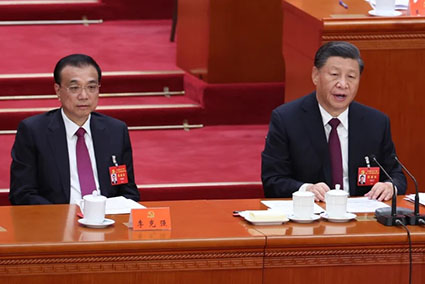Analysis by WorldTribune Staff, October 27, 2023
Even before the “Wuhan Virus” made life dangerous everywhere, Communist leader Xi Jinping had been purging leaders who analysts say posed a threat to his power. Some lost power and others disappeared or flat out died for reasons best not disputed.
In 2007, Li Keqiang was being touted as a possible future leader of the Chinese Communist Party (CCP).

Last October, Li stepped down as China’s second-highest ranking official at a twice-a-decade party congress when Xi, who is two years older than Li, secured his third term as the party’s general secretary.
On Thursday, Li Keqiang suffered a sudden heart attack while in Shanghai, according to the official Xinhua News Agency. He died shortly after midnight after “all-out efforts to revive him failed,” said Xinhua, which didn’t provide further details. He was 68.
Meanwhile, Wu Zunyou, the epidemiologist instrumental in driving the country’s strict and violently unpopular zero-COVID measures that suspended access to cities and confined millions to their homes, died on Oct. 27. He was 60.
The news of Wu’s death came just hours after the death of former Premier Li Keqiang was announced.
An announcement from China’s Center for Disease Control and Prevention about Wu’s death gave no cause, but said that “rescue measures failed.” He had taken a low public profile while battling cancer. Wu earned his master’s and doctorate from the University of California, Los Angeles, and specialized in HIV/Aids prevention in China.
“Xi has already neutralized Li’s political networks and surrounded himself with loyal supporters,” said Neil Thomas, a fellow for Chinese politics at Asia Society Policy Institute’s Center for China Analysis.
In March of this year, Li officially handed over the premiership to Li Qiang, a close confidante of Xi.
An official obituary from China’s propaganda machine, issued on Friday, cited Li’s contributions in implementing Xi’s policies, including efforts to boost economic development, reduce rural poverty and combat the Covid-19 pandemic.
“The obituary name-checked Xi five times, including references to how Li had performed his duties under Xi’s strong leadership and — in retirement — continued to uphold Xi’s authority,” the Wall Street Journal reported.
Li’s death “is a great loss to the party and the country,” said the obituary, which called on the Chinese people to turn grief into strength and rally around Xi’s leadership.
The obituary was issued more than 10 hours after the initial announcement of Li’s death.
Li was the Communist Party’s No. 2 official from 2012 to 2022.
On the Chinese social-media platform Weibo, the hashtag #ComradeLiKeQiangDied# became a top-trending topic. Many users noted the suddenness of Li’s death. “Too young!” one wrote. Another said, “Can’t believe it! Premier Li is an open-minded person, a frank person. Long live Premier Li!”
The Wall Street Journal added: “Some users posted quotations from the late premier, seemingly meant as implicit rebukes of Xi’s leadership. One widely cited remark was Li’s insistence last year that ‘the Yangtze and Yellow River won’t flow backwards’ and that China wouldn’t reverse its policy of opening up to the outside world — something that Xi’s critics have accused him of doing.”
Authorities haven’t announced specific funeral arrangements for Li.
“Xi will likely tolerate some level of public grief but crush any attempts to use Li’s death to organize public protests or mobilize opposition to his leadership,” Thomas said.
Li’s death, given his relative youth compared to incumbent and retired leaders, “will obviously raise uncomfortable questions about Xi Jinping’s own mortality and the lack of succession mechanisms,” said Jude Blanchette, a China expert at the Center for Strategic and International Studies in Washington.
